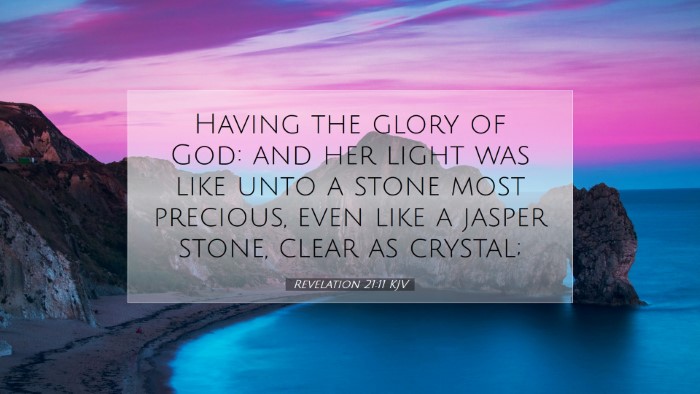Commentary on Revelation 21:11
Verse: Revelation 21:11 (KJV)
"Having the glory of God: and her light was like unto a stone most precious, even like a jasper stone, clear as crystal."
Understanding the Context
The Book of Revelation, attributed to John the Apostle, presents a prophetic vision of the end times and the ultimate victory of good over evil. Chapter 21 introduces the new heaven and new earth, describing the holy city, New Jerusalem, which descends from God. This particular verse highlights the city’s divine glory and radiance.
Matthew Henry's Insights
Matthew Henry remarks that the New Jerusalem represents the eternal state of believers, characterized by the glory of God. He observes that the description of the city is both literal and symbolic, denoting not just physical attributes but also spiritual truths. In this context, Henry emphasizes that God’s glory reflects His holiness and majesty. The precious stones mentioned symbolize the purity and perfection of the new order where God dwells among His people.
- God’s Glory: The glory of God is central to the essence of the New Jerusalem. Henry notes that it is illuminating and defining for the city.
- Symbolism of Light: The light being likened to precious stones emphasizes not just beauty but also the transparency and clarity of divine truth.
- Christian Hope: This vision inspires believers to look forward to a future filled with divine presence, sustaining hope in trials.
Albert Barnes' Commentary
Albert Barnes elaborates on the imagery of light as seen in this verse. He interprets the “jasper stone” as signifying the holiness and glory of God. Barnes suggests that the clarity of this light represents the unobstructed presence of God among His people, providing an illuminating guide in the eternal state.
- Pearls and Precious Stones: Barnes connects the use of precious stones to the nature of God’s creation, showcasing the inherent beauty of His kingdom.
- Clarity as Purity: The clarity, akin to crystal, indicates the purity of the divine nature, free from sin and imperfection.
- Communal Presence: The description suggests an intimate community with God where believers enjoy His fullness.
Adam Clarke's Perspective
Adam Clarke offers a theological interpretation of the New Jerusalem as a realization of God’s promises to His people. He underscores that the “glory of God” depicted here is a transformative experience for the redeemed. Clarke focuses on the brightness of the city, attributing it to the direct influence of God’s presence. He asserts that this light transcends physical understanding, shedding spiritual significance on the life of each believer.
- Transcendence of God: Clarke notes that the light is not merely a physical phenomenon but a manifestation of God’s transcendence.
- Personal Transformation: The sight of God’s glory will have a profound impact on the nature and character of the redeemed, affecting their existence eternally.
- Sustained Worship: The light represents an eternal worship environment, fostering continual communion with the Creator.
Theological Reflections
In synthesis, Revelation 21:11 ultimately envisions the culmination of God’s redemptive work, where the divine glory is revealed in a tangible and magnificent form. For pastors and theologians, this text provides rich material for preaching on divine presence, hope for eternal fellowship, and the promise of a transformed existence where God’s reign is fully realized.
- Hope in Crisis: This vision serves as a powerful reminder for believers facing trials, instilling hope through the assurance of what lies ahead.
- Call to Holiness: Understanding the glory of God as reflected in New Jerusalem encourages a lifestyle of holiness now, preparing for the coming eternity.
- Encouragement for Unity: The communal aspect of the city highlights the importance of Christian fellowship, unity, and shared faith in the present age.
Conclusion
Revelation 21:11 invites us into a deeper understanding of God’s glory, illuminating the hope and reality for believers in the new creation. The insights drawn from Matthew Henry, Albert Barnes, and Adam Clarke collectively affirm the centrality of divine presence in the believer's life.
This verse serves as an anchor for faith, an encouragement to pursue holiness, and an inspiration to look forward to the ultimate fulfillment of God’s promises.


